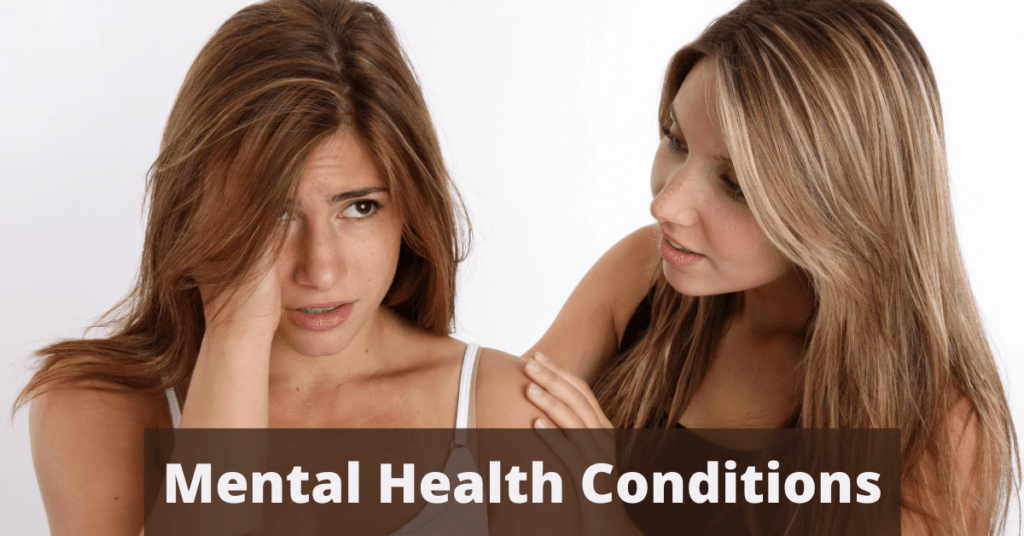Contents
Mental Health Conditions

Mental health conditions affect millions of people across the world, and those who suffer from these conditions deserve necessary care. The severity of mental health conditions can range from mild to debilitating, and in some cases, these conditions can be life-threatening. Despite this, there remains a stigma attached to mental health that leads many people to suffer in silence.
Mental health conditions can include anxiety disorders, bipolar disorder, depression, eating disorders, obsessive-compulsive disorder, post-traumatic stress disorder, and schizophrenia. But each of these conditions can have a significant impact on the life of the person who suffers from it.
Mental health conditions can be treated with a variety of therapies, including medication, cognitive-behavioral therapy, and psychotherapy. Although the treatment is often necessary to help the person manage their condition and help maintain a healthy lifestyle. However, mental health conditions are sometimes chronic, meaning they can last for years or be lifelong.
The stigma attached to mental health conditions often prevents affected people from seeking the necessary help to manage these conditions. But ignoring emotional issues and maintaining silence about these issues will only cause them to worsen over time. So those who suffer from mental health conditions should not be ashamed to seek help. And they should not feel like they are alone. There are many people who suffer from mental health conditions, and there is no shame in admitting that you need help.
Depression
Depression is an illness that affects the way you think, feel, and act. It’s also the leading cause of disability in the United States for people between the ages of 15 and 44. Minor depression or dysthymia is a chronic but less severe form of depression. Symptoms are milder, but it lasts for at least two years. Major depression is one of many types of depressive disorders. When someone has this type of depression, they may be sad or irritable nearly every day for weeks or months without periods of feeling better in between.
Symptoms include-
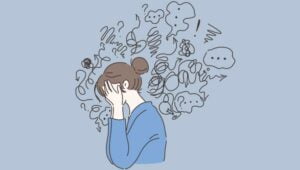
- Loss of interest in activities you once enjoyed
- Changes in appetite or weight
- Sleep disturbances such as insomnia or hypersomnia
- Lack of energy
- Low self-esteem
- Lack of ability to focus or concentrate
- Feelings of hopelessness
- Worthlessness
- Self-harm or thoughts of death
Major depression is also one of the most treatable forms of depression. Depression treatment may be done on an outpatient basis or include inpatient treatment if needed. It is good news that it can be treated successfully.
Anxiety
Anxiety is a mental health condition that encompasses a group of symptoms stemming from excessive worry or fear. Minor anxiety or Generalized Anxiety Disorder (GAD) is a chronic but less severe form of anxiety. Symptoms include being easily startled, having difficulty concentrating on tasks, worrying about things going undone. And sometimes experiencing panic attacks without an obvious trigger. Whereas Major anxiety is one of many types of anxiety disorders. When someone has this type of anxiety, they may feel panicked for no reason or excessively worried about everyday things going wrong all the time.
Symptoms include a combination of physical symptoms such as-

- Fatigue
- Headaches
- Muscle tension
- Panic attacks
- Fear
- Depression
- Obsessive thoughts
Treatment of anxiety is considered to be best done with cognitive-behavioral therapy (CBT). However, there are several other techniques that can be used for this type of treatment. And one technique that has been shown to be successful in the treatment of anxiety is exposure therapy. For example, this type of therapy focuses on gradually exposing someone experiencing anxiety to the things they fear, teaching them coping mechanisms, and learning how to deal with their anxiety response.
Schizophrenia
Schizophrenia is a mental disorder that causes the person to interpret reality abnormally- causing them to see or hear things that don’t exist. Any number of things may trigger this condition, but it always starts with some sort of hallucination. Schizophrenia is often hereditary, and it can be caused by other physical ailments like drug abuse or brain damage. Schizophrenia also affects how someone acts and behaves- including the form of speech they use. It’s important to get treatment right away to deal with this condition before it really takes over one’s life.
Symptoms of Schizophrenia-

- Disorganized speech and thinking
- disorganized or catatonic behavior including inappropriate emotions
- hallucinations (usually auditory)
- delusions, such as paranoia
- lack of social communication skills
- grossly disorganized behavior.
- Schizophrenia is a genetic mental disorder that typically presents in men between the ages of 18 to 25
There are a few different types of treatment for Schizophrenia. The most common is called antipsychotic medication. This type of medication helps to control the symptoms of the disorder by blocking certain receptors in the brain. There are also psychosocial treatments that can be used to help people with schizophrenia. These treatments include-
- Cognitive-Behavioral Therapy (CBT)
- family therapy
- social skills training
- peer support groups
- self-help groups
- occupational therapy
- Art and music therapy
PTSD
PTSD is a serious, sometimes debilitating condition that can result from the experience of a traumatic event.
The term PTSD was coined in 1980 when it became one of three diagnoses specified in an edition of the Diagnostic and Statistical Manual of Mental Disorders (DSM). It’s important to know that PTSD is not just an emotional response to trauma. PTSD shares characteristics with other anxiety disorders, depression, and substance abuse.
The causes of PTSD include Childhood sexual or physical abuse, childhood neglect or abandonment, combat exposure, domestic violence, serious accidents, natural disasters, terrorist attacks
Symptoms of PTSD –
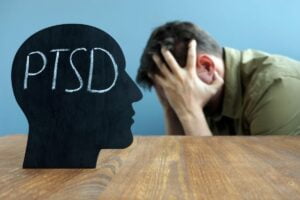
- intrusive memories or flashbacks of the traumatic event
- avoidance of anything that reminds the person of the event
- negative changes in mood and emotions, such as guilt, shame, or anger
- difficulty concentrating and sleeping
- hypervigilance, or constantly being on guard for danger
- excessive alcohol or drug use
Treatments for PTSD include Antidepressants, Psychotherapy, and Group Therapy.
Bipolar Disorder
Bipolar disorder is a type of mood disorder that causes the sufferer to have extreme highs and lows. People who are 18-25 years old are the most common target of this condition. Although some victims acquire the condition even as children. One of the most powerful treatments for this condition is antipsychotic medications which can help with regulating thoughts, feelings, and mood.
Symptoms of Bipolar Disorder-
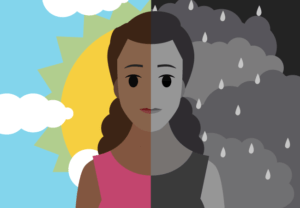
- Manic episodes
- Depressive episodes
- Mixed manic episode
- Rapid cycling
- Cyclothymia (similar to bipolar disorder but with less severe symptoms)
Bipolar disorder is often treated with the use of antipsychotic medications which help to regulate thoughts, feelings, and mood.
There are a few different types of treatment for bipolar disorder. Antidepressant medication is also prescribed in order to help with regulating thoughts, feelings, and mood. Therapy can also be used as a form of treatment for bipolar disorder.
Eating Disorders
Eating disorders are a type of mental illness that is characterized by abnormal eating habits. There are three main types of eating disorders- anorexia nervosa, bulimia nervosa, and binge eating disorder.
Anorexia nervosa is a condition that is characterized by the person having an intense fear of gaining weight or becoming fat. People who suffer from this disorder often have an unrealistic image of themselves and will go to great lengths to lose weight. Some people with anorexia nervosa will starve themselves while others will exercise excessively.
Bulimia nervosa is a condition that is characterized by the person binge eating and then purging their food by vomiting or using lax. People who suffer from bulimia nervosa tend to keep their disorder a secret because of the shame they feel.
Symptoms of eating disorder-

- Loss of menstruation in women
- Extreme fear of gaining weight
- Increased anxiety when food is present
- Insomnia, fatigue, and dizziness
- Heart abnormalities
- Anemia
- Pale skin coloration due to lack of nutrients
- Enamel erosion on teeth due to stomach acid exposure
The treatment of eating disorders can be difficult because of the wide range of patients.
Some treatments for eating disorders are psychotherapy, cognitive-behavioral therapy, and anti-depressants. These treatments can help with behaviors that are indications of an eating disorder. And few ways to help yourself if you’re suffering from an eating disorder is to find a coping mechanism or outlet for your stress. For example, exercise, that reduces the risk of binge eating. Other interventions include hypnotherapy and social skills training.
Treatment also includes addressing underlying causes such as mental health conditions, relationship issues, family problems, school difficulties, and work problems.
Autism Spectrum Disorder (ASD)
Autism Spectrum Disorder (ASD) is a developmental disorder that affects the way a person communicates and interacts with others.
ASD can cause problems with social interaction, verbal and nonverbal communication, and repetitive behaviors. That is why people who have ASD often have difficulty understanding what others are saying and expressing their own thoughts and feelings. And they may also engage in repetitive behaviors such as rocking back and forth or flapping their hands.
Symptoms of Autism Spectrum Disorder (ASD)
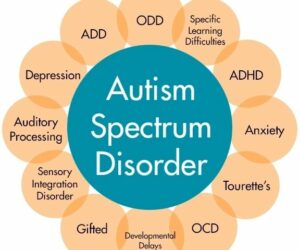
- Difficulty with social interaction
- Verbal and nonverbal communication problems
- Repetitive behaviors such as rocking or hand flapping
Treatment plans are tailored to the individual needs of the person. Some common treatments for ASD include behavioral therapy, medications, social skills training, and dietary interventions.
Behavioral therapy helps the person with ASD develop the skills needed to interact with others. Medications can be helpful in treating coexisting conditions, difficulties following routines, and hyperactivity. Social skills training is beneficial as it helps the person with ASD learn to communicate better with others. This is possible by improving their social behavior, working on conversation skills, and learning how to make friends.
Psychosis
Psychosis is a serious mental health condition that can cause the person to lose touch with reality. People who are experiencing psychosis may see or hear things that aren’t there, believe that someone is trying to harm them, or think that they are someone else.
Psychosis can be a symptom of a number of mental health conditions, including-
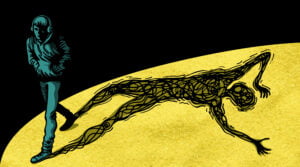
- Bipolar disorder
- Schizophrenia
- Major depressive disorder
There is no one-size-fits-all treatment for psychosis. So treatment plans are tailored to the individual needs of the person. Some common treatments for psychosis include antipsychotic medications cognitive-behavioral therapy, and support groups. Antipsychotic medications help to manage hallucinations and other psychotic behaviors. Whereas cognitive-behavioral therapy helps the person with psychosis learn how to function in their everyday environment. And support groups provide a safe place for people who are experiencing similar struggles or concerns.
Dissociative Disorders
Dissociative Disorders are a group of mental health conditions that involve a loss of contact with reality. People who have Dissociative Disorders may feel like they are watching themselves from the outside, or like they are in a dream.
Dissociative Disorders can be a symptom of a number of mental health conditions, including-

- Bipolar disorder
- Schizophrenia
- Major depressive disorder
The cause of Dissociative Disorders is unknown. But the possible causes are a combination of environmental and genetic factors. Although there is no one-size-fits-all treatment for Dissociative Disorders. But some common treatments for Dissociative Disorders include cognitive-behavioral therapy, dialectical-behavioral therapy, and psychiatric medications. Cognitive-behavioral therapy helps the person with Dissociative Disorders understand how their thoughts and behaviors are affecting their life. Whereas dialectical-behavioral therapy helps the person with Dissociative Disorders manage difficult emotions and interpersonal relationships.
Conclusion
Mental health conditions are extremely common, affecting an estimated one in five adults in the United States each year. There are a variety of factors that cause these conditions, such as genetics, life experiences, or chemical imbalances in the brain. While mental health conditions can be very challenging to live with. There are many resources available to help people manage their symptoms. But the good thing is that there is treatment available for mental health conditions. Treatment for mental health conditions may include medication, therapy, or a combination of both. With the right support, most people can live full and productive lives despite their mental health conditions.
If you are looking for affordable Online Counseling MantraCare can help: Book a trial therapy session
